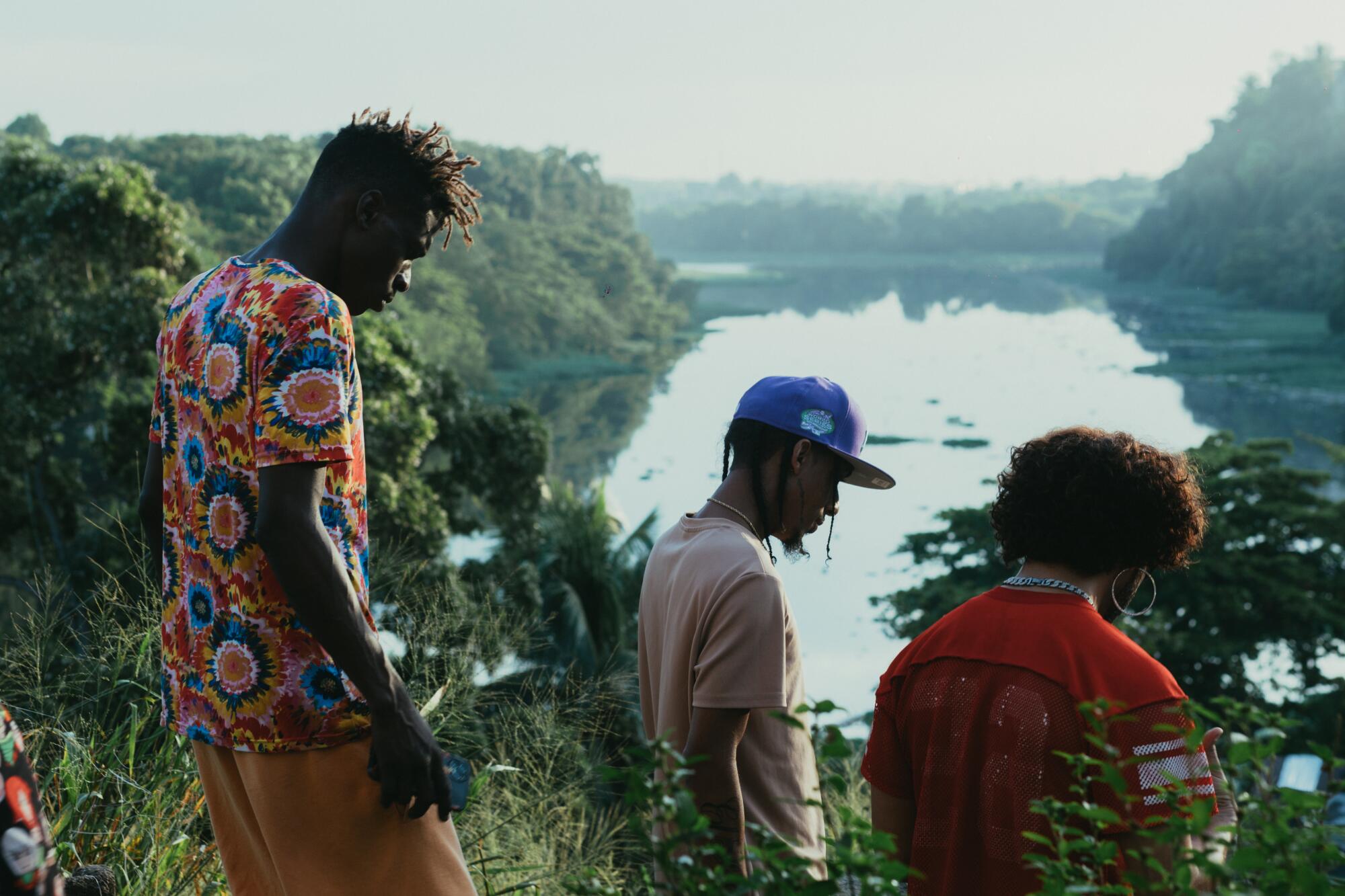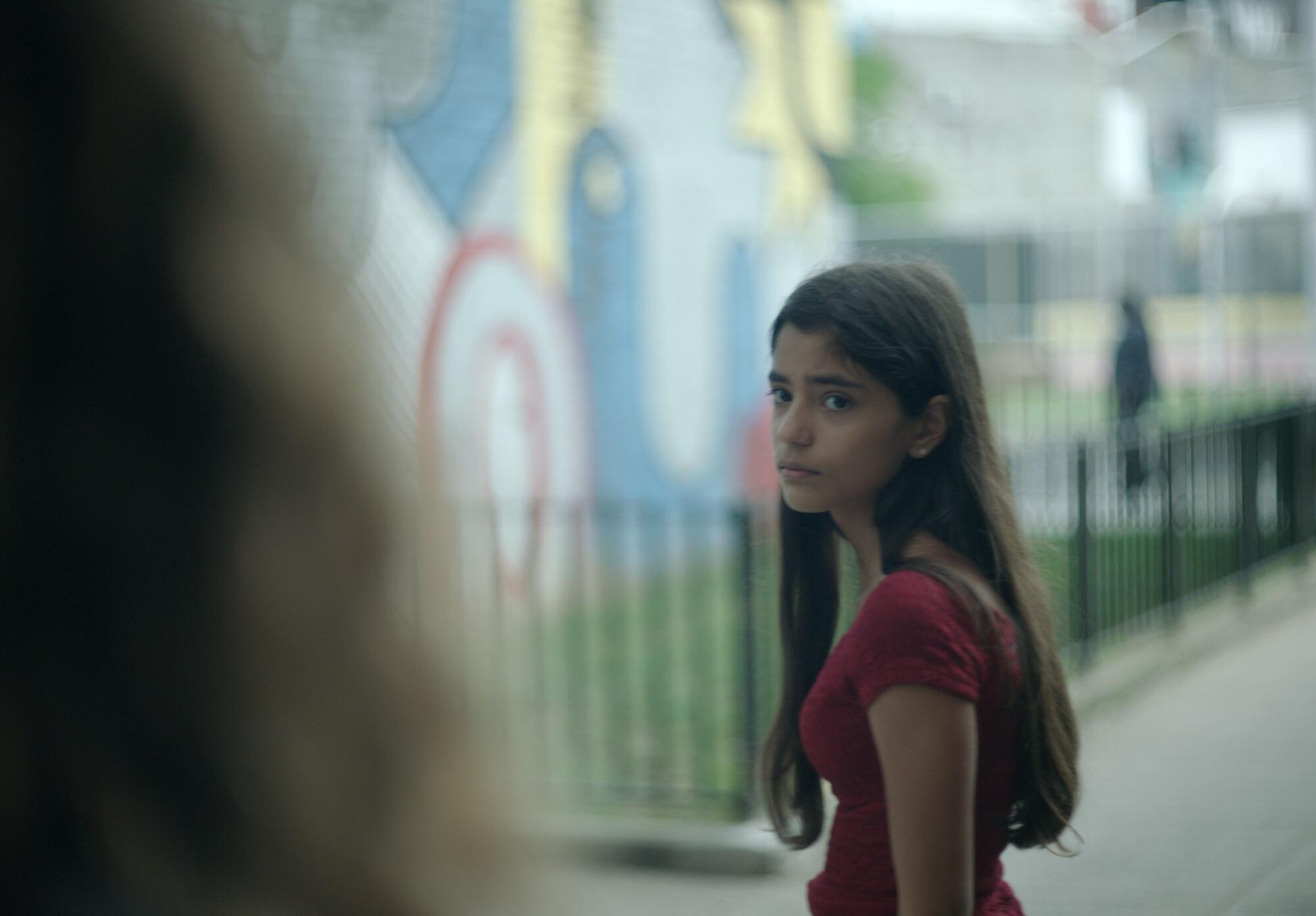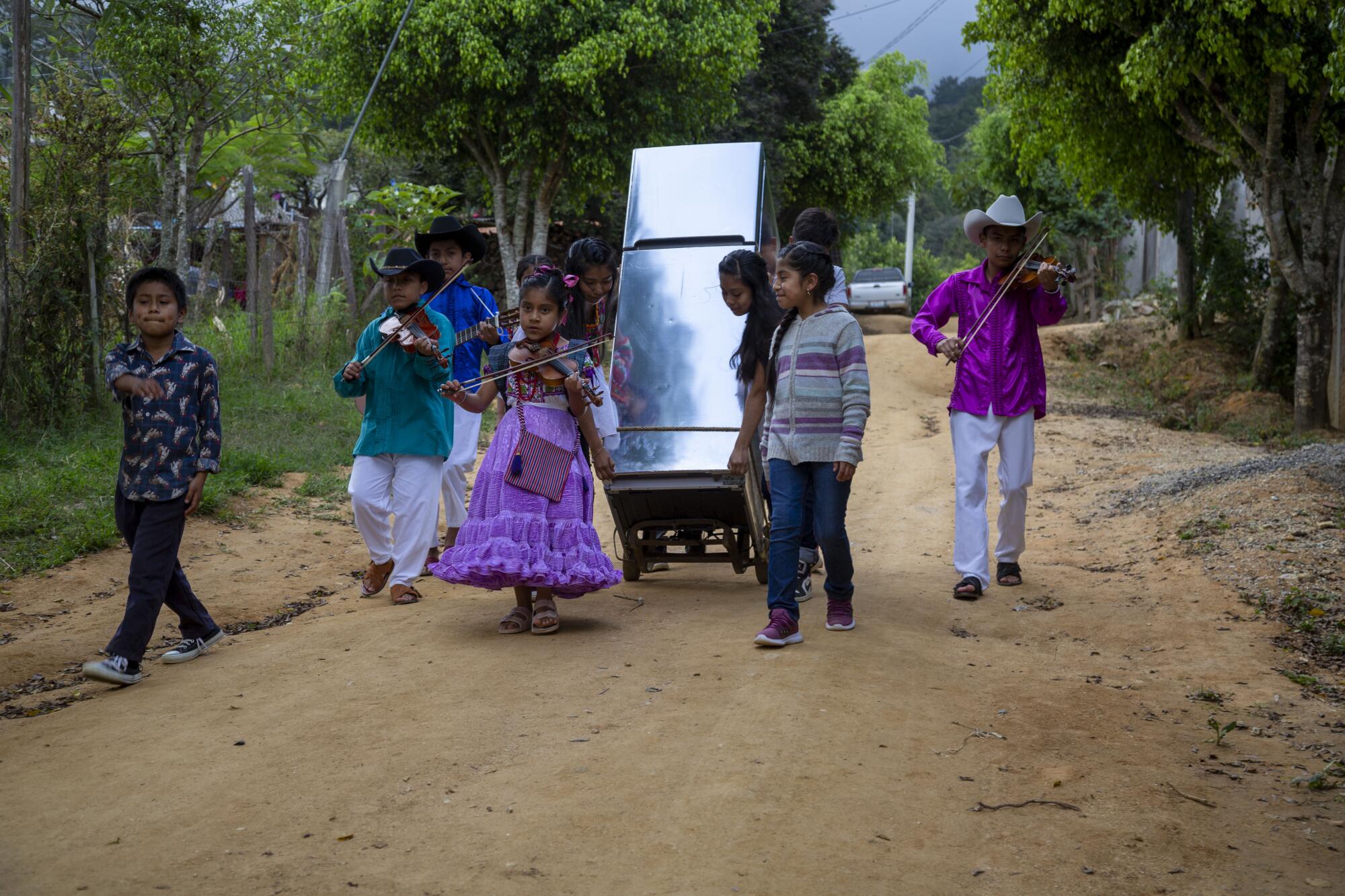
- Share via
Forget Memorial Day weekend. Summer movie-loving begins with the Los Angeles Latino International Film Festival, five days of films pertinent to the experiences of U.S. Latinos, as well as a wide-ranging collection of productions from across Latin America. The event is often one of the few chances L.A. audiences get to see some of these stories.
The big-screen festivities kick off with the Gael García Bernal-produced documentary “ASCO: Without Permission,” about the 1970s Chicano art collective. The program also features titles that debuted at this year’s Sundance Film Festival: the L.A.-set satire “Serious People” (the festival’s closing night film); “Mad Bills to Pay (or Destiny, dile que no soy malo),” the Bronx tale centering a young father struggling to stay afloat; and “Rains Over Babel,” the Colombian queer ensemble piece about an otherworldly bar.
To help you parse through the offerings, here’s a list of 10 films not to miss at the fest.
“42nd Street”
Prolific filmmaker José María Cabral dares to go where cameras have not always been welcomed: la 42. The epicenter of dembow music and Dominican urban culture where “teteos,” or endless parties, are both integral to the local economy and the space where artistic innovation flourishes. Narrated as if a deceased local producer Zuamy (voiced by Ramón Emilio Candelario) were speaking from the beyond, the kinetic docufiction introduces audiences to the key figures in this music movement, the outsiders fascinated by its energy and even the police officers tasked with reining in the violence and drug trafficking in the area.

“Beloved Tropic”
The always remarkable Chilean actress Paulina García (“Gloria”) turns in a harrowing performance in Ana Endara Mislov’s delicately rendered and breezily beautiful drama examining the sharper edges of motherhood. García plays Mechi, an aging woman dealing with dementia who was once a successful business owner. Hired as a live-in caretaker in the opulent home, Ana Maria (Jenny Navarrete), a pregnant Colombian immigrant in Panama City hiding a major secret, develops a genuine bond with the initially standoffish Mechi, making for an unassumingly poignant and superbly acted two-hander.

“Brownsville Bred”
The Puerto Rican flag once held a prominent place in the Brownsville, Brooklyn apartment Elaine Del Valle (played largely by an extraordinary Nathalia Lares) grew up in. But as her music-loving father’s flaws come into the limelight, forcing her to mature, her identity takes on more complex shades. This lively and touching autobiographical film adaptation of the novel and stage play of the same name — written by Del Valle herself — chronicles Elaine’s coming of age amid the challenges of a disadvantaged neighborhood, but also the joys of a tight-knit community. Sorrow and wonder intermingle in the astute girl’s turbulent journey.

“Espina”
Playing a fictionalized version of himself, Jonathan Benaim, a disabled Venezuelan man, leads this irreverent “revenge” narrative. The Jonathan on-screen enlists Angela (Paulina Mondragón), his impromptu chaperone, and his driver Eduardo (telenovela heartthrob Aarón Díaz) to travel to Panama and find the daughter of the doctor responsible for his condition. Via piercing dark humor — including cheeky thoughts from Jonathan’s mind as on-screen text sprinkled throughout — Benaim and writer-director Daniel Poler defy sanctimonious societal expectations imposed on individuals living with physical disabilities.

“Papá Melissa”
Luminous, candid and brimming with thought-provoking contradictions, this concise cinematic portrait introduces a non-conforming family in Mexico City where a spiritually minded, disarmingly charming trans woman, Melisa Hackerman, functions as father figure to five children and romantic partner to Claudia, a cisgender woman with traditional views on womanhood. Through evocative visual flourishes that reflect a connection to Indigenous traditions, their household dynamic is observed with curiosity and compassion, yet always probing at the more peculiar ideologies at play in their interpersonal relationships.

For the record:
12:54 p.m. May 28, 2025A previous version of this article identified the community in the film “La Raya” as Zapotec. Though the community does identify as Indigenous, they don’t identify as Zapotec.
“La Raya”
The young Indigenous people in La Raya, a small rural town in Oaxaca where the Chatino language is spoken, dream of migrating north to the United States, seeking prosperity. But in this subtly playful gem propelled by magical realism, those who remain or have returned are the focus. When Sotera (Diana Itzel Cruz Baltazar), a perspicacious girl whose parents are on this side of the border, and her friend Erick (Noé Salvador ) come across a mysterious refrigerator — a strange sight in these parts — a series of unexpected events unfold.

“Olivia & the Clouds”
A whimsical mixed-media fantasia, this Dominican work of shape-shifting animation takes an oneiric approach to exploring an elderly woman’s memories, including that of a lover from her past, as well as her present-day relationship with her adult son, who in turn is dealing with his own romantic woes. Each vividly entrancing frame combines intricate techniques (hand-drawn characters or stop-motion) and endlessly innovative transitions to express surrealist concepts that collectively create a truly inspired and inspiring work of art.

“Shaman”
Effectively unnerving and strikingly photographed, this horror effort is concerned with the clash between Christianity and pre-Columbian traditions. Bent on evangelizing the Indigenous population in a remote Ecuadorian village, Candice (Sara Canning), a white American woman, alongside her husband and teenage son, must confront endemic beliefs and the man who holds the knowledge about them: the shaman. The confrontation, and what it unleashes, comes to a head when Candice realizes the key to saving herself and her loved ones might be on the other side of the spiritual fence.

“Trans Los Angeles”
Comprised of three separate trans-centric stories, this anthology features Carmen Carrera as a formerly incarcerated sex worker on a new path, a straight man grappling with his friends’ regressive views on trans women and a Salvadoran trans immigrant in South Gate yearning for connection. Aside from depicting a wide array of trans experiences, filmmaker Kase Peña portrays working-class lives in a city often depicted as a playground for the privileged. Her characters travel on the public transport and engage firsthand with the unglamorous but still relevant realities of a vast metropolis.

“Uvalde Mom”
A farmworker turned heroine during a parent’s worst nightmare, Angeli Rose Gomez bypassed the authorities and rescued her sons from the horrific shooting at Robb Elementary School in Uvalde, Texas, on May 24, 2022. This sobering documentary doubles as an indictment of a town that still overlooks its large Mexican American population and a police force that didn’t do enough to protect local children — 19 of whom were murdered that day — but swiftly retaliated against a mother who denounced their negligent inaction.

More to Read
The Latinx experience chronicled
Get the Latinx Files newsletter for stories that capture the multitudes within our communities.
You may occasionally receive promotional content from the Los Angeles Times.






